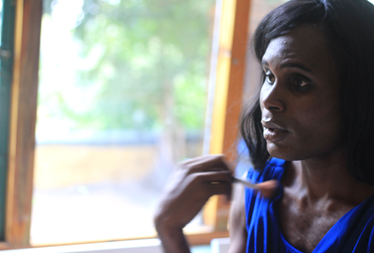How I survived as a transgender woman from Nigeria
 © James Obi/Frontline AIDS
© James Obi/Frontline AIDS
My name is Jessica Albert. I wasn't born with that name, but that is what I am now called. Being born in Nigeria, this was a big problem as lesbian, gay, bisexual and transgender people (LGBT) are often rejected by their families, churches and schools.
I always felt like a woman trapped in a man’s body. As a child I wanted to wear dresses and play with dolls, but my parents tried to beat this out of me. I experienced a childhood of aggression and violence at the hands of my family, and rejection and loneliness at school with daily insults, and occasional physical assaults.
My parents sent me to various pastors for exorcisms, believing that I was demon possessed. But nothing changed. They always told me to behave like a man, or they would disown me. They finally did this when I was at university, leaving me destitute and alone.
Facing stigma and discrimination
At the age of 26, I found out that I was living with HIV. I was devastated, but I couldn’t talk to anyone about it because of the extreme stigma I knew I would face.
Then, in 2014, I was arrested for being gay, and spent several weeks in prison. I was repeatedly and brutally assaulted by both police and inmates. Finally, a friend paid my bail and I was released – a broken person.
After the passing of increased anti-gay legislation in Nigeria in 2014, I faced 14 years in prison just for being who I was. I had no choice but to leave my home country. I came to South Africa, where I am now free to be who I am, to live and love as I choose.
Finding refuge in South Africa
When I arrived in South Africa I knew no one, I had nowhere to live and I had defaulted on my HIV treatment. Luckily, I found out about the Jesuit Refugee Service (JRS), and after an interview with their social worker they helped me with paying rent for six months and buying food. It enabled me to find my feet in South Africa and start my life over. JRS also referred me to a health clinic so I could resume my antiretroviral treatment.
I now have a job as a waitress, a loving partner, and the Jesuit Refugee Service’s support group has become my new family.
I still love my family back home – they are my flesh and blood. But Nigeria is such a deeply homophobic society that they will never change and accept me. My advice to LGBT people in Nigeria – get out while you are still in one piece. My advice to South Africans – recognise the persecution that LGBT people suffer in other countries, and give those that come here asylum.
Support Jessica received from the Jesuit Refugee Service was funded by a grant from the Rapid Response Fund, which is managed by Frontline AIDS and funded by the Elton John AIDS Foundation.
This article was written as the International HIV/AIDS Alliance, before we changed our name to Frontline AIDS.
Tags
LGBTNigeriaRapid Response FundSouth Africa



